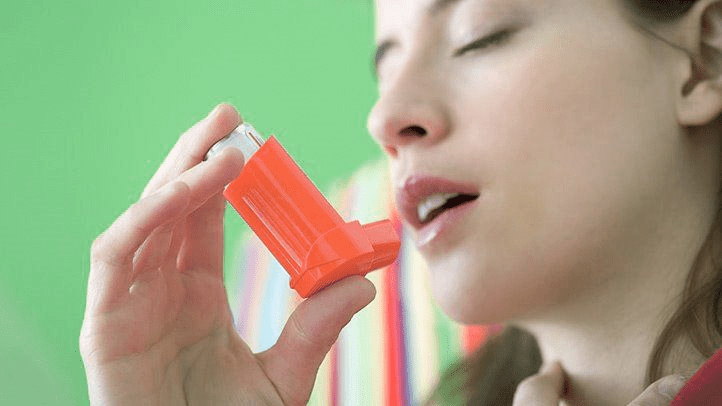List of OTC inhalers for asthma -
The FDA approves not many OTC inhalers for use in asthma. Only a handful of inhalers are available for use without a prescription. 7 best OTC inhalers available for use are:-
Primatene Mist HFA
- Headache
- dizziness
- Increased blood pressure
- Tremors
- Sweating
- Rapid heartbeat
-
Asthmanefrin
 Asthmanefrin is a metered dose inhaler (MDI) and therefore contains a fixed number of doses you can take with one inhaler. It contains racepinephrine as the rescue drug that falls under the class of drugs called bronchodilators. When inhaled through an atomizer, it provides temporary relief from wheezing and shortness of breath.
The inhaler can safely be used in children between 4 and 12 years. This inhaler might have a few side effects. However, the benefit to the user is greater than the side effects it may have, such as,
Asthmanefrin is a metered dose inhaler (MDI) and therefore contains a fixed number of doses you can take with one inhaler. It contains racepinephrine as the rescue drug that falls under the class of drugs called bronchodilators. When inhaled through an atomizer, it provides temporary relief from wheezing and shortness of breath.
The inhaler can safely be used in children between 4 and 12 years. This inhaler might have a few side effects. However, the benefit to the user is greater than the side effects it may have, such as,
- Headache
- confusion
- High blood pressure
- Tremors
- Seizure
- Rapid or irregular heartbeat
-
Epimist
-
Bronkaid inhaler
- Headache
- Vomiting
- Tremors
- Sweating
- Stomach upset
-
Vicks's steam inhaler
-
Bronkaid Max caplets
-
Primatene Tablets
Risks in using OTC inhalers for Asthma -
The risks of using OTC inhalers to provide symptomatic relief include the following:- Misdiagnosing
- Underdosing
- Overdoing
Precautions while using OTC inhalers -

- It is a good idea to tell your doctor before using any OTC medication to be aware of any risks.
- OTC inhalers should not be used on a long-term basis. It should only be used in an emergency, such as an asthma attack.
- Read the direction and instead well before using an OTC inhaler.
- OTC inhalers can interact with other medications. Check with your doctor if there is any possible interaction between your OTC inhaler and any medicine you are currently on.
- Immediately consult your doctor if signs of side effects persist longer than usual.
Takeaway -
Asthma inhalers over the counter are a convenient and safe way to control your asthma symptoms. They are easy to use and can be purchased at your nearest drugstore. If you have an asthma attack and need an inhaler, it's important to have one on hand to help you breathe easier. If you have an OTC inhaler, keep it with you at all times to prepare for an asthma attack. Also, contact your doctor immediately if the symptoms do not stop after using a rescue inhaler.Frequently Asked Questions
Can I use OTC inhalers during an asthma attack?
Yes, you may use OTC inhalers during a sudden asthma attack to relieve the symptoms of shortness of breath and chest tightness. However, doctors only recommend using OTC inhalers in patients with mild asthma. Also, OTC is not to be used for the long term. They are only to be used to provide symptomatic relief.
Can I get salbutamol over the counter?
Salbutamol is the most widely used drug in treating asthma and dilating the airway, but it is only available on prescription by a doctor.
What is the quick relief for asthma?
Quick relief inhalers contain drugs such as salbutamol, and formoterol, which are bronchodilators. However, these are only available when prescribed by a doctor. OTC inhalers also contain epinephrine that dilates the airway in an emergency asthma attack.

Reviewed by